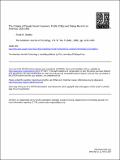| dc.contributor.author | Dobbin, Frank | |
| dc.date.accessioned | 2009-09-08T12:43:26Z | |
| dc.date.issued | 1992 | |
| dc.identifier.citation | Dobbin, Frank R. 1992. The origins of private social insurance: Public policy and fringe benefits in American, 1920-1950. American Journal of Sociology 97, no. 5: 1416-1450. | en |
| dc.identifier.issn | 0002-9602 | en |
| dc.identifier.uri | http://nrs.harvard.edu/urn-3:HUL.InstRepos:3264874 | |
| dc.description.abstract | How did the American system of private, employment-related pension and health insurance arise? Data on corporate fringe-benefit programs during the second quarter of the 20th century contradict the received wisdom that benefits rose in response to wartime federal policy changes and industrial factors. Instead it appears that public policies such as the Wagner Act and Social Security led to union and business support for private insurance, which in turn spurred the growth of fringe benefits. The historical record suggests that neoinstitutional and conflict approaches must be synthesized to explain the expansion of fringe benefits: institutional factors influenced organizational outcomes by affecting interest group goals. | en |
| dc.description.sponsorship | Sociology | en |
| dc.language.iso | en_US | en |
| dc.publisher | University of Chicago Press | en |
| dc.relation.isversionof | http://dx.doi.org/10.1086/229906 | en |
| dc.relation.hasversion | http://www.wjh.harvard.edu/soc/faculty/dobbin/cv_online.html#PUBLICATIONS | en |
| dash.license | LAA | |
| dc.title | The Origins of Private Social Insurance: Public Policy and Fringe Benefits in America, 1920-1950 | en |
| dc.relation.journal | American Journal of Sociology | en |
| dash.depositing.author | Dobbin, Frank | |
| dc.date.available | 2009-09-08T12:43:26Z | |
| dc.identifier.doi | 10.1086/229906 | * |
| dash.contributor.affiliated | Dobbin, Frank | |


